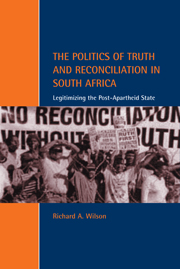Book contents
- Frontmatter
- Contents
- List of Acronyms and Glossary
- Maps
- Preface and Acknowledgements
- 1 Human Rights and Nation-Building
- PART I Human Rights and Truth
- 2 Technologies of Truth: The TRC's Truth-Making Machine
- 3 The Politics of Truth and Human Rights
- PART II Reconciliation, Retribution and Revenge
- Notes
- Bibliography
- Index
3 - The Politics of Truth and Human Rights
Published online by Cambridge University Press: 10 November 2009
- Frontmatter
- Contents
- List of Acronyms and Glossary
- Maps
- Preface and Acknowledgements
- 1 Human Rights and Nation-Building
- PART I Human Rights and Truth
- 2 Technologies of Truth: The TRC's Truth-Making Machine
- 3 The Politics of Truth and Human Rights
- PART II Reconciliation, Retribution and Revenge
- Notes
- Bibliography
- Index
Summary
The last chapter demonstrated how a positivist methodology led to a particular version of truth in the TRC's final Report, one which lacked an overall explanatory framework apart from the moral language of denunciation. The substitution of a morality tale for a rigorous analysis of the organization of violence resulted from the requirements of the post-apartheid nation-building project and the need to legitimate new state institutions. This chapter extends our examination of the tensions between truth-telling and nation-building by looking at the content of the Report and specifically how it dealt with accusations that highranking apartheid-era state officials fomented violence during the 1990–1994 negotiations period.
First, this chapter contends that the TRC stopped short of finding that there was a centrally directed plan of violent destabilization since it eschewed theorizing the link between violence and the apartheid state; it opted for the wrong periodization of the past and failed to see continuities in counter-insurgency strategies of the 1980s and 1990s. Secondly, the TRC balked at issuing a subpoena for Inkatha Freedom Party leader Mangosuthu Buthelezi and fully investigating his responsibility in the public violence of his members, either through his actions or neglect. This it did largely out of deference to the ANC's consolidation of state power and its political overtures to its old enemy, the IFP.
- Type
- Chapter
- Information
- The Politics of Truth and Reconciliation in South AfricaLegitimizing the Post-Apartheid State, pp. 62 - 94Publisher: Cambridge University PressPrint publication year: 2001

